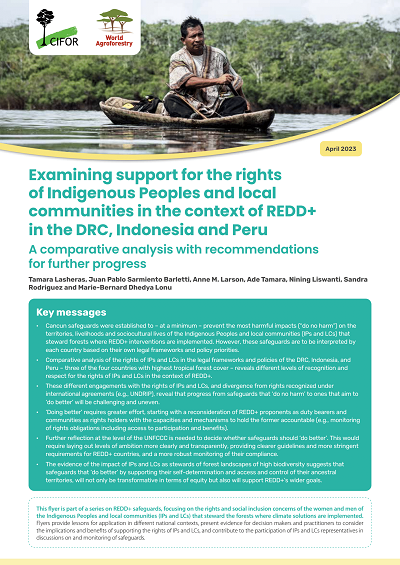Key messages
- Cancun safeguards were established to – at a minimum – prevent the most harmful impacts (“do no harm”) on the territories, livelihoods and sociocultural lives of the Indigenous Peoples and local communities (IPs and LCs) that steward forests where REDD+ interventions are implemented. However, these safeguards are to be interpreted by each country based on their own legal frameworks and policy priorities.
- Comparative analysis of the rights of IPs and LCs in the legal frameworks and policies of the DRC, Indonesia, and Peru – three of the four countries with highest tropical forest cover – reveals different levels of recognition and respect for the rights of IPs and LCs in the context of REDD+.
- These different engagements with the rights of IPs and LCs, and divergence from rights recognized under international agreements (e.g., UNDRIP), reveal that progress from safeguards that ‘do no harm’ to ones that aim to ‘do better’ will be challenging and uneven.
- ‘Doing better’ requires greater effort, starting with a reconsideration of REDD+ proponents as duty bearers and communities as rights holders with the capacities and mechanisms to hold the former accountable (e.g., monitoring of rights obligations including access to participation and benefits).
- Further reflection at the level of the UNFCCC is needed to decide whether safeguards should ‘do better’. This would require laying out levels of ambition more clearly and transparently, providing clearer guidelines and more stringent requirements for REDD+ countries, and a more robust monitoring of their compliance.
- The evidence of the impact of IPs and LCs as stewards of forest landscapes of high biodiversity suggests that safeguards that ‘do better’ by supporting their self-determination and access and control of their ancestral territories, will not only be transformative in terms of equity but also will support REDD+’s wider goals.
Download:
Publication year
2023
Authors
Lasheras, T.; Sarmiento Barletti, J.P.; Larson, A.M.; Tamara, A.; Liswanti, N.; Rodriguez, S.; Dhedya Lonu, M-B.
Language
English
Keywords
indigenous people, local community, sustainable development, development policy, community forestry
Geographic
Peru, Indonesia, Democratic Republic of the Congo
























